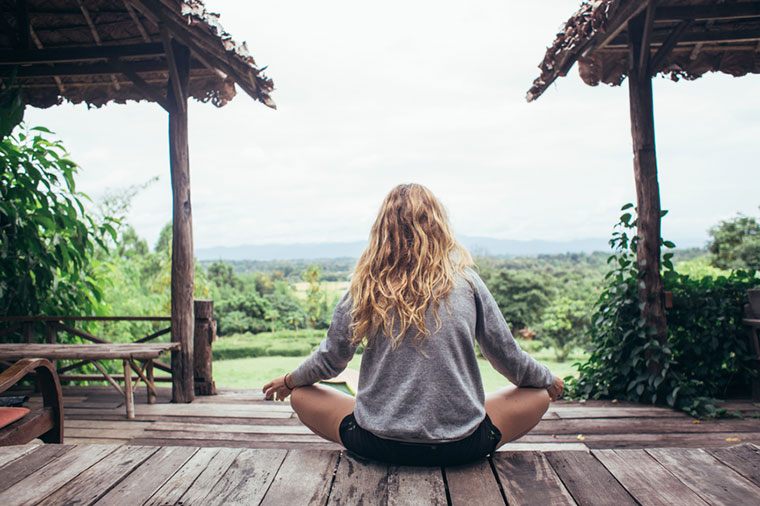Back in the day, when your mom banned you from watching television and told you to go to your room to sit quietly in silence, it definitely wasn't something that had any perks (that you knew of, at least).
But these days, silence is something people are actively seeking out—something they're even shelling out thousands of dollars to get, whether it's through silent spa resorts or retreats. In fact, some in the wellness field consider total quiet a newfound luxury. "It's because it's so rare now," says Beth McGroarty, research director at the Global Wellness Institute. "It's funny that people pay for silence, because that's how bad [modern life] is—[silence] is so precious."
"People pay for silence, because that's how bad [modern life] is."
Of course, the appeal of silence isn't anything new (in fact, it's been a mainstay among enlightened individuals for centuries), but the upsurge in interest is undeniable. Whether it's a monthly membership to a boutique meditation center or flying to Bali to spend $120 a night seeking solitude, more and more destinations are catering to the busy person who needs a break from it all.
Yes, celebs included: Meditation aficionado Gisele went quiet for three days in Costa Rica, while Emma Watson went on a silent retreat after a bad breakup to "figure out how to be at home with [herself]," she says.
But is silence truly a luxury—and a boon to your well-being? Here's what you need to know.

The benefits of quiet
To be clear, silence isn't just a lack of noise—it can lead to a domino effect of positive mental health perks that result in a decrease in stress and an increase in overall happiness and awareness (seriously).
Engaging in stillness for any significant length of time can be a de-stresser, according to McGroarty. "Studies have shown that when the brain is silent, your hippocampus—the center for organizing thoughts—actively creates neurons," she says. "Your cortisol also drops, as well as your heart rate and blood pressure. There's a mental and a physical impact." Compare this to when you're staring at your phone or computer screen and your cortisol shoots up with every (disconcerting) news flash.
"The only way to cure your mind is to observe it and relax."
"Quietness is free of all kinds of pain," swears Michael Hall, a Washington, D.C.-based yogi who recently went on a vipassana meditation silent retreat (at an invitation-only, pay-as-you-wish spot in Los Angeles). "If you've had anything weighing on your heart or your head, those sorts of things melt away into a comfortable, peaceful nothingness."

{{post.sponsorText}}
Of course, that's after 10 full days of complete silence. But any time you give to the practice can be powerful. "The only way to cure your mind is to observe it and relax," adds Zana Barisic Dosen, founder of Silent Mind Retreat in Croatia. "And from that state, you can do wonders."

Why you need to seek silence
You can't experience true silence when your cellphone is basically an extension of your hand—the idea of it is learning to shut everything off. And that's not as easy as you'd think. "The digital revolution—in particular the smartphone—causes stress and cognitive confusion that can make people feel crazy," says McGroarty. (As I'm writing this I'm concurrently receiving emails, texts, and Slacks, and my boss is asking me a question, so she may have a point.) "Now, people are looking to disconnect through travel and truly unplug."
Various options include actual silent retreats (where people are quiet for anywhere from a day to—for the more hardcore—a couple of months), silent spa destinations (sort of like a retreat, but with saunas and massages), and hotels where you surrender your phone at check-in.
"These resorts and studios are an attempt to actually create the silence of nature. In other words, scenarios where you can't plug in."
But with the latest batch of retreats and experiences, unplugging goes far beyond a digital detox."That's just one aspect," McGroarty explains. "These resorts and studios are an attempt to actually create the silence of nature, whether while bathing, eating, or getting treatments. In other words, these are scenarios where you can't plug in," even if you want to.
Take, for example, Dosen's Silent Mind Retreat, where you head to an island off of Croatia and are taught breathing techniques as you hike and observe your mind. "This aims to bring stillness to your soul," the founder says.
Others, like Spirit Rock Meditation Center in West Marin County, California, offer various stay options (from day-long drop-ins to two-month stays) that involve walking meditations in the woods. (A week-long stay will set you back around $1470.) Then there are places like Holy Isle in Scotland, which has a seven-day retreat that lets participants get shiatsu massages to complement their practice in such a lushly green, scenic locale (for roughly $800). In other words, you've got options.

How to find silence (even if you're not on a retreat)
So where should you go to seek pure quiet? If you're not ready to spend an entire vacay practicing being quiet, there are more casual ways to incorporate silence on the reg.
Besides retreats and restorative hotel packages that allow you to disconnect (New York's cushy Mandarin Oriental lets you drop off your phone at check-in), you can also visit silent restaurants to practice the art of mindful eating (as is the case at Brooklyn's Icharon) or silent spas to experience saunas and other revitalizing body rituals (Hedon Spa in Estonia and Therme Laa in Austria, for example).
"True silence isn't just using noise-canceling headphones—it's a meditation in a quiet environment," says McGroarty. "And this is definitely within reach for people now, not only with apps but through classes, which are currently exploding. It's doable, but it's something you have to commit to." She notes that studies have shown that a mere five minutes of silence a day can have a positive impact on the brain. So, while it's something that's frequently being offered as something you pay for, you at least know to seek it out—even if it's finding a quiet place or drop-in meditation studio.
"True silence isn't just using noise-canceling headphones—it's a meditation in a quiet environment."
Traveling to immerse yourself in nature will also do the trick, she adds. "You don't realize how much noise there is—even in silent rooms—because of all the technology," McGroarty explains. But you can do that wherever you are, too—studies have found that a 90-minute walk outside can noticeably decrease negative emotions. If you're stuck in a city, maybe take this as a case for buying a ticket to that national park you've been meaning to visit (or just aim for that tiny square of grass near your office when you need a mid-day mindful break).
Really, it's about making an effort to shut out the clatter, indoors or out. "There's a remarkable lack of quiet moments—moments where you're not doing anything, just thinking," says McGroarty. "That's led to the need for this." It's not always so easy to find—unless you know how to look.
You could also opt to visit the dreamy wellness destination that Pippa Middleton's honeymooning at. Just make sure to travel with healthy essentials—here are the 4 things Gwyneth Paltrow always brings with her on a plane.
Loading More Posts...